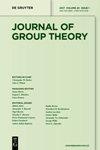对于某些𝑘∈𝐺,群𝐺满足一个泛函方程𝑓(χ𝑘)= χ𝑓(χ)
IF 0.5
3区 数学
Q4 MATHEMATICS
引用次数: 0
摘要
摘要研究了一类群𝐺,它们具有一个奇异的性质,即存在一个元素k∈G k \in G和一个函数f: G→G f \colon G \to G,使得f(x)减去(x)减去f(x)减去f(xk)减去xf(x)对于所有x∈G x \in G都成立。这一性质源于对群上的近环和输入输出自动机的研究。我们称具有此属性的组为𝐽-group。有限的𝐽-groups必须是奇阶的,因此是可解的。证明了奇数阶幂零群是一个𝐽-group,如果它的幂零类𝑐满足c≤6 c≤\leqslant 6。如果𝐺是有限的𝑝-group,且p>2 p>2且p>2∑c-1 p^{2}>2c-1,则证明𝐺是𝐽-group。最后,如果p>2 p>2并且𝐺是一个规则的𝑝-group,或者更一般地说,是一个幂闭的𝑝-group(即,在每个部分中并且对于每个m小于1 m \geqslant 1, p {m p^m} -幂的子集是一个子群),那么我们证明𝐺是𝐽-group。本文章由计算机程序翻译,如有差异,请以英文原文为准。
The groups 𝐺 satisfying a functional equation 𝑓(𝑥𝑘) = 𝑥𝑓(𝑥) for some 𝑘 ∈ 𝐺
Abstract We study the groups 𝐺 with the curious property that there exists an element k ∈ G k\in G and a function f : G → G f\colon G\to G such that f ( x k ) = x f ( x ) f(xk)=xf(x) holds for all x ∈ G x\in G . This property arose from the study of near-rings and input-output automata on groups. We call a group with this property a 𝐽-group. Finite 𝐽-groups must have odd order, and hence are solvable. We prove that every finite nilpotent group of odd order is a 𝐽-group if its nilpotency class 𝑐 satisfies c ⩽ 6 c\leqslant 6 . If 𝐺 is a finite 𝑝-group, with p > 2 p>2 and p 2 > 2 c - 1 p^{2}>2c-1 , then we prove that 𝐺 is 𝐽-group. Finally, if p > 2 p>2 and 𝐺 is a regular 𝑝-group or, more generally, a power-closed one (i.e., in each section and for each m ⩾ 1 m\geqslant 1 , the subset of p m p^{m} -th powers is a subgroup), then we prove that 𝐺 is a 𝐽-group.
求助全文
通过发布文献求助,成功后即可免费获取论文全文。
去求助
来源期刊

Journal of Group Theory
数学-数学
CiteScore
1.00
自引率
0.00%
发文量
45
审稿时长
6 months
期刊介绍:
The Journal of Group Theory is devoted to the publication of original research articles in all aspects of group theory. Articles concerning applications of group theory and articles from research areas which have a significant impact on group theory will also be considered.
Topics:
Group Theory-
Representation Theory of Groups-
Computational Aspects of Group Theory-
Combinatorics and Graph Theory-
Algebra and Number Theory
 求助内容:
求助内容: 应助结果提醒方式:
应助结果提醒方式:


